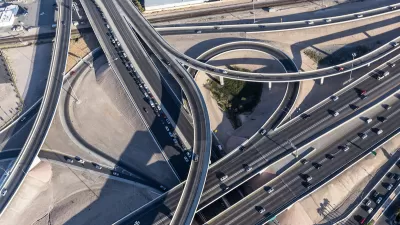How best to "plug the growing hole" in the Highway Trust Fund which provides the federal revenue for roads and transit: increase the gas tax, new vehicle miles traveled fees, more road tolls, or "corporate tax reform"? All but one is a user fee.
"With a growing Hill consensus on the use of corporate tax dollars to plug the Highway Trust Fund hole, a first-ever detailed proposal from the White House could help move the ball along as the House and Senate committees move forward in the coming months," writes Politico transportation reporter Adam Snider.
The 'hole' refers to the difference between the current revenue of the Highway Trust Fund, primarily gas and diesel taxes, and its expenditures on transportation - estimated at $20 billion per year as we noted last month. Obama's proposal calls for "$150 billion in new revenue generated by business tax reform" over four years, making up half his $300 billion plan.
Earlier, Streetsblog USA reporter Tanya Snyder wrote of the congressional proposal, "Few details have emerged about exactly how Republican House Ways and Means Chair Dave Camp plans to do this, but Politico has heard from Capitol Hill staffers that it would push $100 billion to $125 billion to transportation over an unspecified time frame."
While that may be good political news with the current transportation bill, MAP-21, expiring in September, and the Highway Trust Fund going broke in August, it does nothing to create a sustainable source of transportation revenue that would be the case if funded entirely by user fees. Moreover, since corporate tax reform revenue could be directed to the general fund and used for deficit reduction, is the use of this business tax revenue nothing but a disguised subsidy for driving?
At least one major transportation player was unhappy. The American Trucking Association's press release addressed the failure of the administration, and presumably Congress, to adjust user fees to fill the transportation funding gap.
“Finding a long term, sustainable way to improve our nation’s roads and bridges is one of ATA’s top priorities,” said ATA Chairman Phil Byrd, president of Bulldog Hiway Express.
“Using the proceeds from corporate tax reform, while creative, does little to address the long-term solvency of the Highway Trust Fund or to uphold the principle of users paying for the services they get, in this case, the federal fuel tax, which has not been adjusted in more than two decades to account for inflation and improvements in vehicle fuel efficiency.
Byrd went on to express ATA's preferred option to 'plug the hole'.
“The fuel tax is, and will continue to be the most efficient and fair way of collecting revenue for highways and bridges and should be adjusted to reflect current economic conditions and needs,” Byrd said.
FULL STORY: Foxx promises highway bill draft — Obama wants big boost in transit spending

Maui's Vacation Rental Debate Turns Ugly
Verbal attacks, misinformation campaigns and fistfights plague a high-stakes debate to convert thousands of vacation rentals into long-term housing.

Planetizen Federal Action Tracker
A weekly monitor of how Trump’s orders and actions are impacting planners and planning in America.

Chicago’s Ghost Rails
Just beneath the surface of the modern city lie the remnants of its expansive early 20th-century streetcar system.

Bend, Oregon Zoning Reforms Prioritize Small-Scale Housing
The city altered its zoning code to allow multi-family housing and eliminated parking mandates citywide.

Amtrak Cutting Jobs, Funding to High-Speed Rail
The agency plans to cut 10 percent of its workforce and has confirmed it will not fund new high-speed rail projects.

LA Denies Basic Services to Unhoused Residents
The city has repeatedly failed to respond to requests for trash pickup at encampment sites, and eliminated a program that provided mobile showers and toilets.
Urban Design for Planners 1: Software Tools
This six-course series explores essential urban design concepts using open source software and equips planners with the tools they need to participate fully in the urban design process.
Planning for Universal Design
Learn the tools for implementing Universal Design in planning regulations.
planning NEXT
Appalachian Highlands Housing Partners
Mpact (founded as Rail~Volution)
City of Camden Redevelopment Agency
City of Astoria
City of Portland
City of Laramie



























